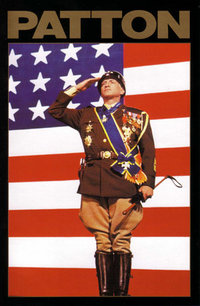Patton movie
Patton is a 1970 biographical film which tells the story of General George Patton's commands during World War II. It stars George C. Scott, Karl Malden and Michael Bates. more...
There were several attempts to make the movie, starting in 1953. The Patton family was approached by the producers for help in making the film. They wanted access to Patton's diaries and input from the family members. By coincidence, the day they asked the family was the day after the funeral of Beatrice Ayer Patton, George Patton's widow. After that, the family was dead-set against the movie and refused to give any help to the filmmakers.
Due to a lack of help from the family, Francis Ford Coppola and Edmund H. North wrote the film from two biographies: Patton: Ordeal and Triumph by Ladislas Farago and A Soldier's Story by Omar Bradley. It was directed by Franklin J. Schaffner. In 2005, his wife's "Button Box" manuscript was finally released by his family, with the posthumous release of his daughter's, Ruth Ellen Patton Totten, book, The Button Box: A Daughter's Loving Memoir of Mrs. George S. Patton.
Scott's performance as Patton won him an Academy Award for Best Actor (which he famously refused, stating that the Oscars were "a meat parade"), and has been called "one of the great performances of all time". Roger Ebert has said, Patton is not a war film so much as the story of a personality who has found the right role to play. Scott's theatricality is electrifying. As Patton he always stands up in his Jeep, loves making speeches, grandstands, plunges into the action to personally goad his men, even directs traffic. There is a touch of the manic about him. He seems to have no personal life.... his heart-to-heart talks are with himself. He seems formidably well-read, lecturing his subordinates on the history of the battlefields, the lessons of Napoleon, the experiences of earlier leaders who came this way. He has a classical quotation for every occasion. "Rommel, you magnificent bastard," he gloats after outsmarting Erwin Rommel, "I read your book!"'
The film won six additional Academy Awards, for Best Art Direction-Set Decoration, Best Director, Best Film Editing, Best Picture, Best Sound and Best Writing, Story and Screenplay Based on Factual Material or Material Not Previously Published or Produced. It was nominated for Best Cinematography, Best Effects, Special Visual Effects and Best Music, Original Score.
A made-for-television sequel, The Last Days of Patton, was produced in 1986. Scott reprised his title role. The movie was based on Patton's final weeks after being mortally injured in a car accident with flashbacks of Patton's earlier life.
In 2003 the United States Library of Congress deemed the film "culturally significant" and selected it for preservation in the National Film Registry.
Patton's Speech
One of the most famous parts of the movie, the speech was both inspirational and shocking for its clear anti-political correctness (written, produced and released during the Vietnam War) and was based on historical research:
Read more at Wikipedia.org



